#NET Result 2022
Explore tagged Tumblr posts
Text



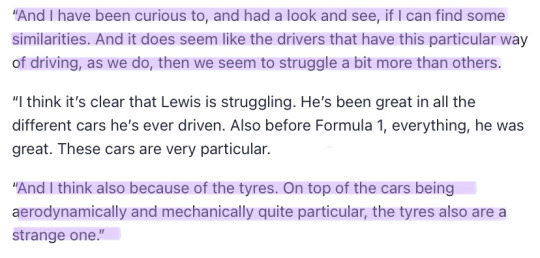

Kevin Magnussen suggests a connection between his driving style and struggles faced by Lewis Hamilton and Daniel Ricciardo in the ground effect F1 era (via PlanetF1)
There are many reasonable parallels that could be drawn between Daniel’s season and Lewis’. They both struggled in qualifying against their teammates but they both almost always recovered in the race. Both Daniel and Lewis had, on multiple times, complained about a lack of feeling with regards to tyres, and that problem wasn’t clearer than during the Miami weekend for Daniel. Unfortunately for Daniel, he was driving a far more inferior car than Lewis and his issues with this generation of cars came across as more pronounced in the tight midfield he was fighting in.
It’ll always be a shame that we’re never going to see Daniel drive the new 2026 regulations …
#if Daniel hadn’t struggled in that first half of 2021 in that McLaren would he have been afforded more leniency in 2022?#we’d probably never know#but the end result would probably have been the same#because they would never have given him the grace they’ve given others that have done worse than him#and he wouldn’t have had being a world champ as a safety net#it’s truly a shame we’ll never see him drive the next gen of cars …#daniel ricciardo
56 notes
·
View notes
Text
this is your periodic reminder that for all the artifacts and errors and "tells" one could possibly list, the only reliable way to actually determine if an image is ai generated is to investigate the source. it is becoming increasingly common for "fake classical paintings" to circulate around curative aesthetic blogs, and everyone should be using this as an opportunity to not only exercise their investigative skills but also appreciate art more in general. you're all checking out the artists you reblog, right? 🫣
so what are some signs to look for? let's use this very good example.

what a lovely late-impressionist piece blended with evocative leyendecker-esque themes! why haven't you ever heard of this artist before? surely tumblr would be all over an artist like this. who is justin brown?
your two options from here are to do a search for the name, or a reverse image search. i prefer reverse image searching, particularly when it comes to a common name like "justin brown". so what does that net?

Immediately, without looking at any text, something is wrong: it barely exists. an actual historical piece would turn up numerous results from websites individually discussing the piece, but no such discussions are taking place. Looking at the text, though, does show the source-- and at least in this case, the creator was honest about their medium.

But let's also look at the "exact matches", in case a source doesn't make itself apparent in the initial sidebar results like this.
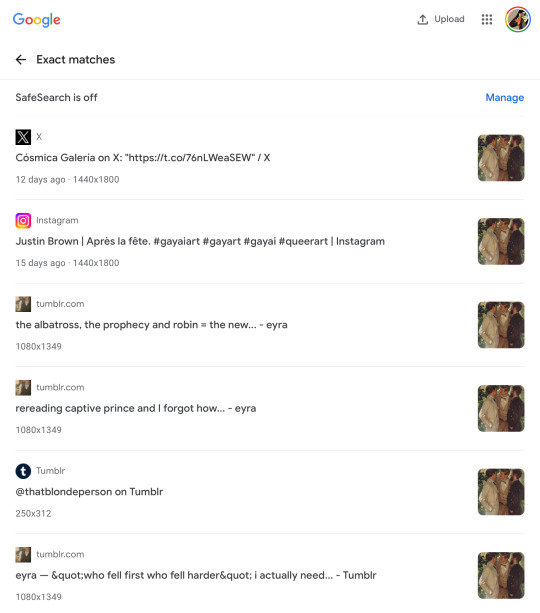
This section will often tell you post dates of images, and here it can be seen that the very first iteration of the image was posted 15 days ago. It did not exist online prior to that.
Seeing how long an unsourced image has been floating around is a skill applicable to more than just generative images! See a cool image of an artifact or other intriguing item with a vivid caption? Reverse search it! If all the results are paired with that caption and only go back a few months, you might just have viral facebook spam.
Sometimes generative creators are dishonest about their medium and do not tag it like in the example, so that's when establishing "jpeg provenance" becomes important. While it can be a little trickier to determine if someone is using generative images and not admitting to it if they aren't trying to pass it off as a classic, something to consider is the age of their account and the frequency with which they post. Here are some account red flags:
-Did they only start posting art after 2022, or if they did before, did their style/skill level WILDLY change? Not gradual improvement-- I'm talking amateur graphite portraits straight into complex digital renders. Everyone starts somewhere, newness is not a red flag alone; it's newness combined with existing in a vacuum away from any community.
-Do they post fully-finished paintings several times a week? -Do many of these paintings seem iterative of a similar theme or subject matter ("three well-dressed young men face each other under shade and dappled sunlight")?
-Does their style change in inconsistent ways? An artist that can swap between painting like Drew Struzan and Hokusai should be pretty well known, right? Why is no one hyping this guy?!
-Do they have social media besides the source instagram? If so, what are they posting about? Are there any WIPs? Doodles? Interactions with other artists? Gallery dates? 3am self-doubt posts? Or is it all self-promo? Crypto? Seemingly nothing art-related at all for someone pushing out 3 weekly paintings?
Basically, if it's important to you to omit this stuff when you curate, please don't just smash reblog if the source doesn't seem to be the OP themselves. Seeking out sources was important even before this became an issue, now it is more than ever.
peace n love
29K notes
·
View notes
Text
The World's Forests Are Doing Much Better Than We Think

You might be surprised to discover... that many of the world’s woodlands are in a surprisingly good condition. The destruction of tropical forests gets so much (justified) attention that we’re at risk of missing how much progress we’re making in cooler climates.
That’s a mistake. The slow recovery of temperate and polar forests won’t be enough to offset global warming, without radical reductions in carbon emissions. Even so, it’s evidence that we’re capable of reversing the damage from the oldest form of human-induced climate change — and can do the same again.
Take England. Forest coverage now is greater than at any time since the Black Death nearly 700 years ago, with some 1.33 million hectares of the country covered in woodlands. The UK as a whole has nearly three times as much forest as it did at the start of the 20th century.
That’s not by a long way the most impressive performance. China’s forests have increased by about 607,000 square kilometers since 1992, a region the size of Ukraine. The European Union has added an area equivalent to Cambodia to its woodlands, while the US and India have together planted forests that would cover Bangladesh in an unbroken canopy of leaves.
Logging in the tropics means that the world as a whole is still losing trees. Brazil alone removed enough woodland since 1992 to counteract all the growth in China, the EU and US put together. Even so, the planet’s forests as a whole may no longer be contributing to the warming of the planet. On net, they probably sucked about 200 million metric tons of carbon dioxide from the atmosphere each year between 2011 and 2020, according to a 2021 study. The CO2 taken up by trees narrowly exceeded the amount released by deforestation. That’s a drop in the ocean next to the 53.8 billion tons of greenhouse gases emitted in 2022 — but it’s a sign that not every climate indicator is pointing toward doom...
More than a quarter of Japan is covered with planted forests that in many cases are so old they’re barely recognized as such. Forest cover reached its lowest extent during World War II, when trees were felled by the million to provide fuel for a resource-poor nation’s war machine. Akita prefecture in the north of Honshu island was so denuded in the early 19th century that it needed to import firewood. These days, its lush woodlands are a major draw for tourists.
It’s a similar picture in Scandinavia and Central Europe, where the spread of forests onto unproductive agricultural land, combined with the decline of wood-based industries and better management of remaining stands, has resulted in extensive regrowth since the mid-20th century. Forests cover about 15% of Denmark, compared to 2% to 3% at the start of the 19th century.
Even tropical deforestation has slowed drastically since the 1990s, possibly because the rise of plantation timber is cutting the need to clear primary forests. Still, political incentives to turn a blind eye to logging, combined with historically high prices for products grown and mined on cleared tropical woodlands such as soybeans, palm oil and nickel, mean that recent gains are fragile.
There’s no cause for complacency in any of this. The carbon benefits from forests aren’t sufficient to offset more than a sliver of our greenhouse pollution. The idea that they’ll be sufficient to cancel out gross emissions and get the world to net zero by the middle of this century depends on extraordinarily optimistic assumptions on both sides of the equation.
Still, we should celebrate our success in slowing a pattern of human deforestation that’s been going on for nearly 100,000 years. Nothing about the damage we do to our planet is inevitable. With effort, it may even be reversible.
-via Bloomburg, January 28, 2024
#deforestation#forest#woodland#tropical rainforest#trees#trees and forests#united states#china#india#denmark#eu#european union#uk#england#climate change#sustainability#logging#environment#ecology#conservation#ecosystem#greenhouse gasses#carbon emissions#climate crisis#climate action#good news#hope
3K notes
·
View notes
Text
Every complex ecosystem has parasites

I'm on a 20+ city book tour for my new novel PICKS AND SHOVELS. Catch me at NEW ZEALAND'S UNITY BOOKS in AUCKLAND on May 2, and in WELLINGTON on May 3. More tour dates (Pittsburgh, PDX, London, Manchester) here.

Patrick "patio11" McKenzie is a fantastic explainer, the kind of person who breaks topics down in ways that stay with you, and creep into your understanding of other subjects, too. Take his 2022 essay, "The optimal amount of fraud is non-zero":
https://www.bitsaboutmoney.com/archive/optimal-amount-of-fraud/
It's a very well-argued piece, and here's the nut of it:
The marginal return of permitting fraud against you is plausibly greater than zero, and therefore, you should welcome greater than zero fraud.
In other words, if you allow some fraud, you will also allow through a lot of non-fraudulent business that would otherwise trip your fraud meter. Or, put it another way, the only way to prevent all fraud is to chase away a large proportion of your customers, whose transactions are in some way abnormal or unexpected.
Another great explainer is Bruce Schneier, the security expert. In the wake of 9/11, lots of pundits (and senior government officials) ran around saying, "No price is too high to prevent another terrorist attack on our aviation system." Schneier had a foolproof way of shutting these fools up: "Fine, just ground all civilian aircraft, forever." Turns out, there is a price that's too high to pay for preventing air-terrorism.
Latent in these two statements is the idea that the most secure systems are simple, and while simplicity is a fine goal to strive for, we should always keep in mind the maxim attributed to Einstein, "Everything should be made as simple as possible, but not simpler." That is to say, some things are just complicated.
20 years ago, my friend Kathryn Myronuk and I were talking about the spam wars, which were raging at the time. The spam wars were caused by the complexity of email: as a protocol (rather than a product), email is heterogenuous. There are lots of different kinds of email servers and clients, and many different ways of creating and rendering an email. All this flexibility makes email really popular, and it also means that users have a wide variety of use-cases for it. As a result, identifying spam is really hard. There's no reliable automated way of telling whether an email is spam or not – you can't just block a given server, or anyone using a kind of server software, or email client. You can't choose words or phrases to block and only block spam.
Many solutions were proposed to this at the height of the spam wars, and they all sucked, because they all assumed that the way the proposer used email was somehow typical, thus we could safely build a system to block things that were very different from this "typical" use and not catch too many dolphins in our tuna nets:
https://craphound.com/spamsolutions.txt
So Kathryn and I were talking about this, and she said, "Yeah, all complex ecosystems have parasites." I was thunderstruck. The phrase entered my head and never left. I even gave a major speech with that title later that year, at the O'Reilly Emerging Technology Conference:
https://craphound.com/complexecosystems.txt
Truly, a certain degree of undesirable activity is the inevitable price you pay once you make something general purpose, generative, and open. Open systems – like the web, or email – succeed because they are so adaptable, which means that all kinds of different people with different needs find ways to make use of them. The undesirable activity in open systems is, well, undesirable, and it's valid and useful to try to minimize it. But minimization isn't the same as elimination. "The optimal amount of fraud is non-zero," because "everything should be made as simple as possible, but not simpler." Complexity is generative, but "all complex ecosystems have parasites."
America is a complex system. It has, for example, a Social Security apparatus that has to serve more than 65 million people. By definition, a cohort of 65 million people will experience 65 one-in-a-million outliers every day. Social Security has to accommodate 65 million variations on the (surprisingly complicated) concept of a "street address":
https://gist.github.com/almereyda/85fa289bfc668777fe3619298bbf0886
It will have to cope with 65 million variations on the absolutely, maddeningly complicated idea of a "name":
https://www.kalzumeus.com/2010/06/17/falsehoods-programmers-believe-about-names/
In cybernetics, we say that a means of regulating a system must be capable of representing as many states as the system itself – that is, if you're building a control box for a thing with five functions, the box needs at least five different settings:
http://pespmc1.vub.ac.be/REQVAR.html
So when we're talking about managing something as complicated as Social Security, we need to build a Social Security Administration that is just as complicated. Anything that complicated is gonna have parasites – once you make something capable of managing the glorious higgeldy piggeldy that is the human experience of names, dates of birth, and addresses, you will necessarily create exploitable failure modes that bad actors can use to steal Social Security. You can build good fraud detection systems (as the SSA has), and you can investigate fraud (as the SSA does), and you can keep this to a manageable number – in the case of the SSA, that number is well below one percent:
https://www.congress.gov/crs_external_products/IF/PDF/IF12948/IF12948.2.pdf
But if you want to reduce Social Security fraud from "a fraction of one percent" to "zero percent," you can either expend a gigantic amount of money (far more than you're losing to fraud) to get a little closer to zero – or you can make Social Security far simpler. For example, you could simply declare that anyone whose life and work history can't fit in a simple database schema is not eligible for Social Security, kick tens of millions of people off the SSI rolls, and cause them to lose their homes and starve on the streets. This isn't merely cruel, it's also very, very expensive, since homelessness costs the system far more than Social Security. The optimum amount of fraud is non-zero.
Conservatives hate complexity. That's why the Trump administration banned all research grants for proposals that contained the word "systemic" (as a person with so-far-local cancer, I sure worry about what happens when and if my lymphoma become systemic). I once described the conservative yearning for "simpler times," as a desire to be a child again. After all, the thing that made your childhood "simpler" wasn't that the world was less complicated – it's that your parents managed that complexity and shielded you from it. There's always been partner abuse, divorce, gender minorities, mental illness, disability, racial discrimination, geopolitical crises, refugees, and class struggle. The only people who don't have to deal with this stuff are (lucky) children.
Complexity is an unavoidable attribute of all complicated processes. Evolution is complicated, so it produces complexity. It's convenient to think about a simplified model of genes in which individual genes produce specific traits, but it turns out genes all influence each other, are influenced in turn by epigenetics, and that developmental factors play a critical role in our outcomes. From eye-color to gender, evolution produces spectra, not binaries. It's ineluctably (and rather gloriously) complicated.
The conservative project to insist that things can be neatly categorized – animal or plant, man or woman, planet or comet – tries to take graceful bimodal curves and simplify them into a few simple straight lines – one or zero (except even the values of the miniature transistors on your computer's many chips are never at "one" or "zero" – they're "one-ish" and "mostly zero").
Like Social Security, fraud in the immigration system is a negligible rounding error. The US immigration system is a baroque, ramified, many-tendriled thing (I have the receipts from the immigration lawyers who helped me get a US visa, a green card, and citizenship to prove it). It is already so overweighted with pitfalls and traps for the unwary that a good immigration lawyer might send you to apply for a visa with 600 pages of documentation (the most I ever presented) just to make sure that every possible requirement is met:
https://www.flickr.com/photos/doctorow/2242342898/in/photolist-zp6PxJ-4q9Aqs-2nVHTZK-2pFKHyf
After my decades of experience with the US immigration system, I am prepared to say that the system is now at a stage where it is experiencing sharply diminishing returns from its anti-fraud systems. The cost of administering all this complexity is high, and the marginal amount of fraud caught by any new hoop the system gins up for migrants to jump through will round to zero.
Which poses a problem for Trump and trumpists: having whipped up a national panic about out of control immigration and open borders, the only way to make the system better at catching the infinitesimal amount of fraud it currently endures is to make the rules simpler, through the blunt-force tactic of simply excluding people who should be allowed in the country. For example, you could ban college kids planning to spend the summer in the US on the grounds that they didn't book all their hotels in advance, because they're planning to go from city to city and wing it:
https://www.newsweek.com/germany-tourists-deported-hotel-maria-lepere-charlotte-pohl-hawaii-2062046
Or you could ban the only research scientist in the world who knows how to interpret the results of the most promising new cancer imaging technology because a border guard was confused about the frog embryos she was transporting (she's been locked up for two months now):
https://www.msn.com/en-us/health/other/horrified-harvard-scientists-ice-arrest-leaves-cancer-researchers-scrambling/ar-AA1DlUt8
Of course, the US has long operated a policy of "anything that confuses a border guard is grounds for being refused entry" but the Trump administration has turned the odd, rare outrage into business-as-usual.
But they can lock up or turn away as many people as they want, and they still won't get the amount of fraud to zero. The US is a complicated place. People have complicated reasons for entering the USA – work, family reunion, leisure, research, study, and more. The only immigration system that doesn't leak a little at the seams is an immigration system that is so simple that it has no seams – a toy immigration system for a trivial country in which so little is going on that everything is going on.
The only garden without weeds is a monoculture under a dome. The only email system without spam is a closed system managed by one company that only allows a carefully vetted cluster of subscribers to communicate with one another. The only species with just two genders is one wherein members who fit somewhere else on the spectrum are banished or killed, a charnel process that never ends because there are always newborns that are outside of the first sigma of the two peaks in the bimodal distribution.
A living system – a real country – is complicated. It's a system, where people do things you'll never understand for perfectly good reasons (and vice versa). To accommodate all that complexity, we need complex systems, and all complex ecosystems have parasites. Yes, you can burn the rainforest to the ground and planting monocrops in straight rows, but then what you have is a farm, not a forest, vulnerable to pests and plagues and fire and flood. Complex systems have parasites, sure, but complex systems are resilient. The optimal level of fraud is never zero, because a system that has been simplified to the point where no fraud can take place within it is a system that is so trivial and brittle as to be useless.

If you'd like an essay-formatted version of this post to read or share, here's a link to it on pluralistic.net, my surveillance-free, ad-free, tracker-free blog:
https://pluralistic.net/2025/04/24/hermit-kingdom/#simpler-times
617 notes
·
View notes
Text
The Best News of Last Week - 29 April 2024
1. Net neutrality rules restored by US agency
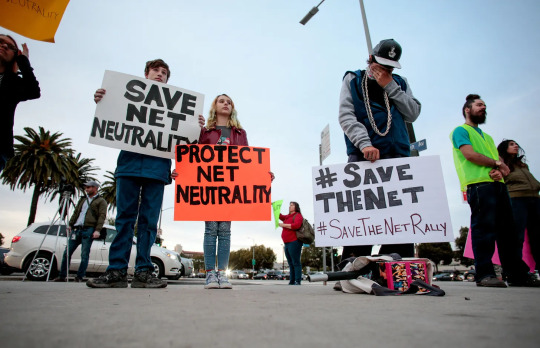
The U.S. Federal Communications Commission voted 3-2 on Thursday to reinstate landmark net neutrality rules and reassume regulatory oversight of broadband internet rescinded under former President Donald Trump.
2. Airlines required to refund passengers for canceled, delayed flights

DOT will also require airlines to give cash refunds if your bags are lost and not delivered within 12 hours.
The refunds must be issued within seven days, according to the new DOT rules, and must be in cash unless the passenger chooses another form of compensation. Airlines can no longer issue refunds in forms of vouchers or credits when consumers are entitled to receive cash.
3. How new mosquito nets averted 13 million malaria cases

Compared to standard nets, the introduction of 56 million state-of-the-art mosquito nets in 17 countries across sub-Saharan Africa averted an estimated 13 million malaria cases and 24,600 deaths. The New Nets Project, an initiative funded by Unitaid and the Global Fund and led by the Innovative Vector Control Consortium (IVCC), piloted the use of dual-insecticide nets in malaria-endemic countries between 2019 and 2022 to address the growing threat of insecticide resistance.
4. Germany has installed over 400,000 ‘solar balconies’

This new wave of solar producers aren’t just getting cheap electricity, they’re also participating in the energy transition.
More than 400,000 plug-in solar systems have been installed in Germany, most of them taking up a seamless spot on people’s balconies.
5. Voyager-1 sends readable data again from deep space

The US space agency says its Voyager-1 probe is once again sending usable information back to Earth after months of spouting gibberish.
The 46-year-old Nasa spacecraft is humanity's most distant object.
6. Missing cat found after 5 years makes 2,000-km journey home

Five years after it ran out the door, a lost cat was returned to a couple in Nevada after it was found thousands of kilometres away. The couple are praising the cat’s microchip for helping reunite them.
7. Restoring sight is possible now with optogenetics

Max Hodak's startup, Science, is developing gene therapy solutions to restore vision for individuals with macular degeneration and similar conditions. The Science Eye utilizes optogenetics, injecting opsins into the eye to enhance light sensitivity in retinal cells.
Clinical trials and advancements in optogenetics are showing promising results, with the potential to significantly improve vision for those affected by retinal diseases.
---
That's it for this week :)
This newsletter will always be free. If you liked this post you can support me with a small kofi donation here:
Buy me a coffee ❤️
Also don’t forget to reblog this post with your friends.
653 notes
·
View notes
Text
50/50
Well, 2024 sure did...happen.
Anyway! I didn't set any sort of goal to watch 50 films and read 50 books this year, but that's where I ended up. Neither number is exactly accurate, and I'm leaving out television, revisiting what I've already read/watched, and all the ridiculous novels I pick up when I'm hungover, but still. I'm kind of impressed with myself. I didn't get to 50 books last year, and I don't think I've watched 50 movies in a year ever---but the more I watch them, the more I explore what they can do and communicate, the more I want to see. As a lifelong reader, it's interesting to explore a new kind of art, to try and intuit your way in through a strikingly different form of communicating the exact same humanness.
TOP FIVE 2024
FILMS
The Florida Project (2017)
Crimes of the Future (2022)
M (1931)
Something in the Dirt (2022)
We’re All Going to the World’s Fair (2021)
It's been months and months since I saw The Florida Project, and I still think about it. The bright and artificial sherbet coloring of it; the dank and mold and shadows that linger around the edges....Actually, I think of all these films in terms of their aesthetics first. Not that there wasn't a story there, but because they all represent such a marriage with form. Consider Crimes of the Future with its fading decay, its browns and rust; M with its stylized, refined cityscape even in the greyscale of 30s cinema; Something in the Dirt where every shot is mundane, or fantastical or both; and We're All Going to the World's Fair, with the particular blue-grey loneliness of the internet age. Surely the benefit of watching a movie (as opposed to anything else) is being presented with something to watch, and I like when directors and creative teams understand that.
Honorable mention to American Psycho (2000) since I'm still a little insane about it---or maybe Corsage (2022) because whether or not it was a good movie, it was nevertheless the most uncompromising, brutal portrait of a historical figure I've seen.
BOOKS
The Rehearsal, Eleanor Catton
Big Swiss, Jen Beagin
Vintner's Luck, Elizabeth Knox
Wylding Hall, Elizabeth Hand
Diavola, Jennifer Thorne
Some people may try to tell you that horror is a discrete genre---I am here to tell you that it's not. All great novels are horror stories, and those listed above especially. From The Rehearsal's self-important artistes, to the therapy-speak Millennials of Big Swiss, to the musicians of Wylding Hall (who miss every sign that Something Is Happening) and the Pace family of Diavola (who deny that the signs mean anything, even after fleeing their vacation home in the night)....all these novels are a study in people experiencing something painful, even terrible. And yet, that provides incredibly fertile territory for their authors to explore the things that come with horror---complicity, desire for closeness, narration and performance, the open wound of family, the thin netting of modernity that keeps us from plunging into something older and darker than we can comprehend.
The only exception might be Vintner's Luck. Not because it's not there as a theme, but because the novel itself spans the narrator's life. By the time he's middle-aged he's committed so many errors, he can't judge too harshly when others do. In this respect it's almost an answer to the questions horror poses---not just how do you survive this? but how do you go on, having survived that?
Honorable mention to Dead Inside, by Chandler Morrison, because it was stomach-turning in the very best way. Echoes of Cipher by Kathe Koja---when an author really knows, really understands, how to wield grossness without shirking or apologizing for it, the result is delightful.
Books of 2020 | Books of 2021 | Books of 2022 | Books of 2023
#from the bookshelf#a proscenium for our dreams#I know we've got another week before we properly reach the end of the year#but I've been dying to publish these lists so you get them early!
121 notes
·
View notes
Note
So now Tony is listed as director at all of Cait‘s companies. What do you think about that?
Dear So Now Anon,
What a coincidence (not!) I just answered a very similar Anon sent to @bat-cat-reader, which I suppose is clear enough.
But to make it even clearer (if at all possible) and keeping in mind what I wrote in that post about Persons of Significant Control, let's check a couple of things, shall we? For all the three other companies C owns.

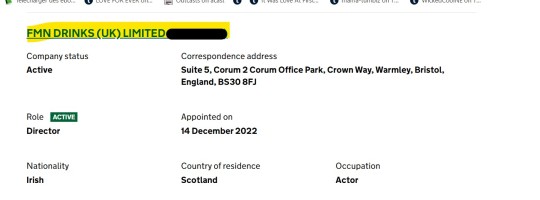
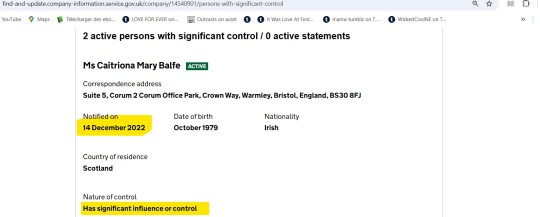
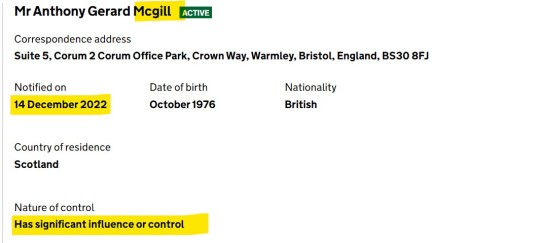
They probably split 50/50 already, which would explain the rather vague 'has significant influence or control'. Why?
Here is why:
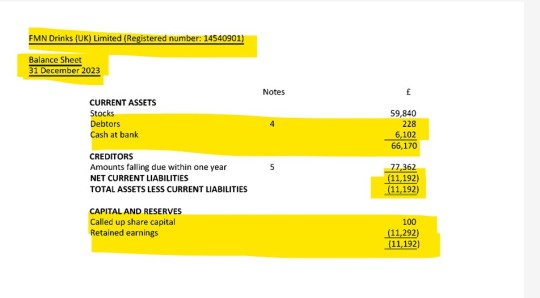
The currently available Balance Sheet, covering the period until 31 December 2023 shows there is not much in there. Barely 100 shares (1£/share), about 59K £ assets and 11 K £ of debts. May I remind you a balance sheet covers the company's assets (available funds, including incoming funds), liabilities (debts) and shareholder equity (the company's net worth, which is roughly the result of subtracting liabilities from assets and dividing them by the number of shareholders). The net worth serves to describe what each and every one of those shareholders are entitled to, should the company be liquidated and all its debts paid off. In this case, the retained earnings, which is the figure quoted between brackets (11.292 £) means the company is in debt/in the red.
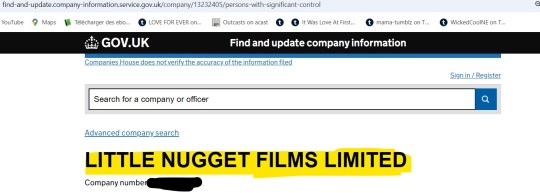

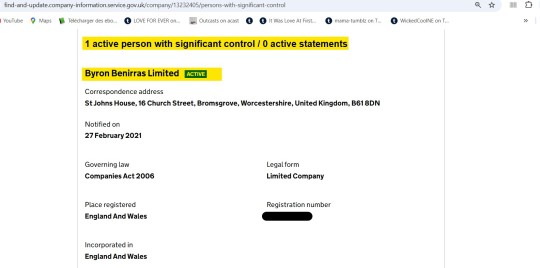

Now, this is very interesting, Anon. Albeit The Happy Couple ™ are now both appointed officers in this company (and T has been so since October 1st 2024), this company's designated PSC is ... Byron Benirras. And who is Byron Benirras' own designated sole PSC? A certain Caitriona Mary B. That is normal - serious 💷💷is indirectly involved, this time, as we know the bulk of her assets is placed there. Therefore, C has full control and sole ownership of Little Nugget Films, too, via Byron Benirras. Remember (ROFLMAO): a legal person (i.e. a company, in this context) has the same rights and the same obligations/duties as the natural (meaning 'real') person behind it (C).
Let's have a look at financials:
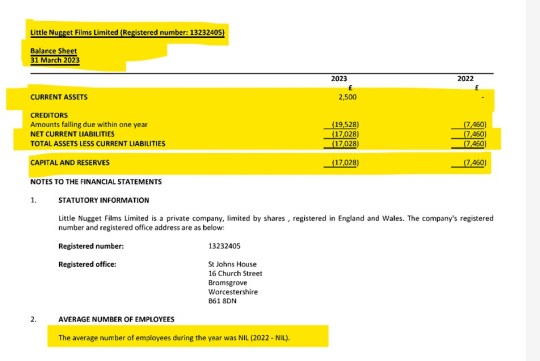
On 31.03.2023, the company's assets were about 2.500 £ only and its liabilities around 17K£. In debt/in the red, too. But a clear will to remain in firm control of things from C's side.
This appears to be a totally, carefully planned move, too - future plans, perhaps?

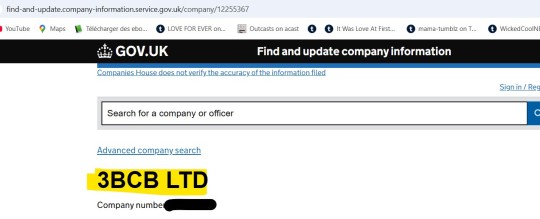

This company has not two, but three appointed officers, one of which is another specialized service company (perfectly legal, in the UK), in charge of all the secretarial work (perfectly legal, too):
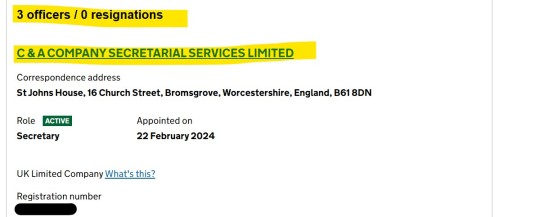
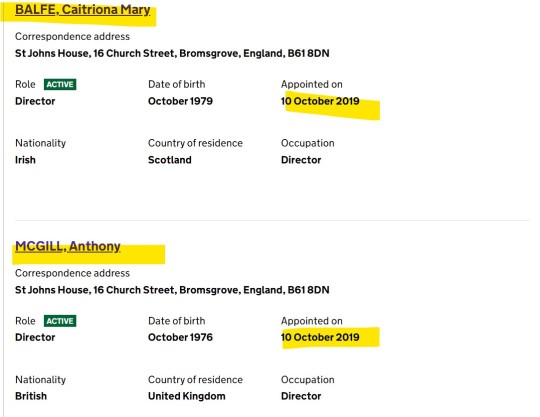
Not one, but two PSCs. Same mechanism as for FMN Drinks UK (see above):
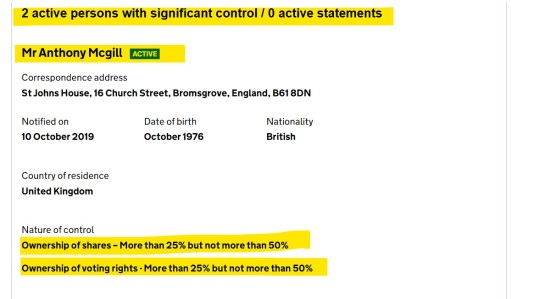

Such a nice, tidy, even split. Why? Heh, indeed: why? Unless...
Let's have a look at the company's balance sheet on 31 March 2023:
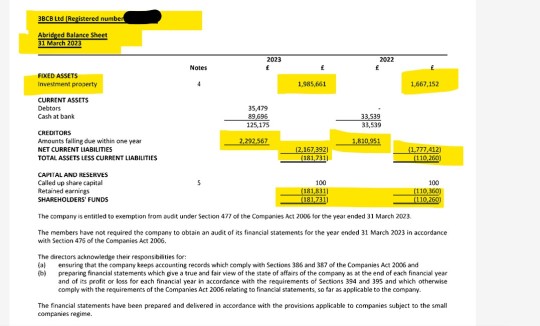
Unless you do acquire real estate using your own funds (a very easy cross check with another one of C's companies reveals the exclusive provenance of those funds - sssh!), no mortgage and no bank loan needed. Property that is legally defined as investment property, which means it cannot legally be a home, nor taxed as such:

[Source: https://prosperity-wealth.co.uk/news/before-you-buy-investment-property/]
Now remind me what real estate might have been bought anytime between 31 March 2022 and 31 March 2023 and valued at about 2.120.000 £?
You'd probably be correct to guess this one:
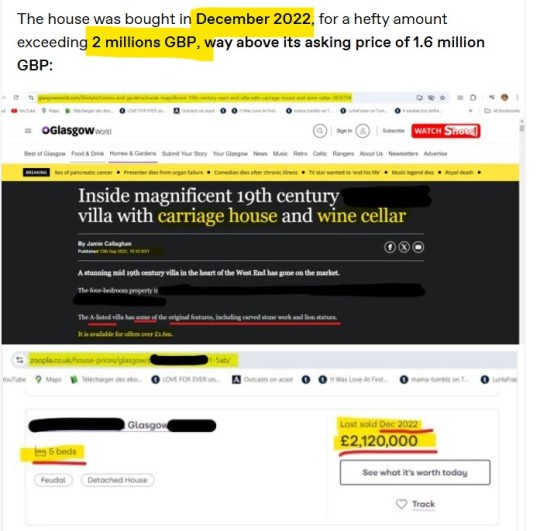
[ For a complete tour of the GLA Taj Mahal's legal intricacies: https://www.tumblr.com/sgiandubh/764266729372368897/anon-rebelde-detecto-un-nerviosismo-muy-revelador?source=share]
Let's have a second look and, surely enough...
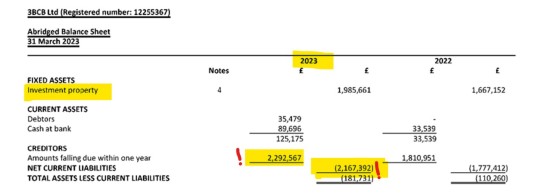
Some simple maths?
2.292.567 (amounts falling due within one year, which covers the 31.03.2022 -31.03.2023 period) - 2.167.392 (net current liabilities) = 125.175 £ (cash at bank). Roger that. I think there is also a second investment property, bought before 31 March 2022 for 1.6 million pounds and shown as such (valued at cost first, then at its fair value, which is evaluated at 1.9 million pounds, in 2023 - a nice appreciation of the initial investment).
I hope this answers your question, Anon. And given the very long and very emotional day that ended (whew, already?) about four hours ago, I hope I didn't miss something or make any gross mistake. You know how some other Anons can be, don't you?
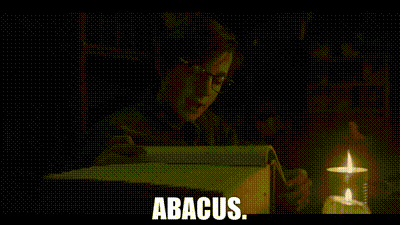
76 notes
·
View notes
Text
A translation (by Fred Gao) of a very interesting recent speech by Liu Shijin, a former Deputy Director of the Development Research Center of the State Council. Liu begins by acknowledging how astonishingly low China's consumption share of GDP is.
"I want to emphasize a concept here." Liu says. "China's insufficient consumption is not an acceptable deviation from international average levels, but a significant gap of 20 percentage points, which can be described as a "structural deviation.""
He proposes several solutions, but to me by far the most interesting is when he discusses government-owned assets: "In 2022, the Chinese government sector's net assets accounted for 38.6% of society's total net assets, significantly higher than other countries."
He goes on to say: "China's high savings rate and low consumption rate are related to the significantly high proportion of government net assets and state-owned equity capital in society's total net assets. This characteristic was advantageous when we were in the industrialization or investment-driven stage, but now that this stage has passed and the problem of insufficient consumption shows a structural deviation, we face a choice: should government net wealth and state-owned capital returns continue to be used for savings and investment, or should they be redirected to support consumption? Clearly, we need to achieve an important transformation, driving the economy from investment-driven to consumption-driven."
He is absolutely right. I have long argued that the low share of GDP retained by Chinese households is partly a result of the high share retained by government (especially local governments), and that the best way for China to resolve its low domestic consumption would be directly or indirectly to transfer wealth from local governments to the household sector. This won't be easy, but it will be the only way for China to rebalance while maintaining GDP growth rates much above 2-3%. Liu Shijin seems to be saying the same thing.
Pettis often describes economic policies "that won't be easy" but since they imply a drastic reimagining of the entire Chinese political system that seems to be understating the difficulty I think.
can the Chinese communist party relinquish control? can the American government tax the rich? these are the two questions that determine the outcome of the 21st century.
36 notes
·
View notes
Note
Hello ! I'm new to Ateez, I have one question 😊 The search engine says Ateez does not have official positions apart from rap line, but I see that there are some unofficial assigned positions: Jongho being main vocalist, Sanhwa being lead vocalists, Yunwoo being main dancers, and Mingi being lead dancer. The results are a bit vague for Yeosang, what is his position ?
Hi Anon!
The unique thing about Ateez is the lack of fixed idol positions among the members. While Mingi and Hongjoong are ostensibly the main rappers, Jongho the main vocalist, and Yunho the dance leader, the emphasis on them being a performance group means that they all pretty much operate at the same high level. Almost all of them have rapped at some point (The Leaders) and all of them have sang at some point (Turbulence, Be With You). I think they've become very good at identifying who suits a certain role in a song regardless of what they've done before.
And what's interesting to me is how they've evolved over the years: San joined as a vocalist and became one of their dominant dancers/performers; Seonghwa joined as a rapper and became a vocalist (and for a time took over some of Mingi's rap parts during his hiatus). Yunho is a dancer who begins most of their songs. Wooyoung joined as a dancer but is known for having the "killing parts" in their songs and performances. Hongjoong is a rapper but his recent stint Moving Voices showed him to be an amazing vocalist. I was reminded of him doing Jongho's part in Bouncy when a few of them guested on Jonathan's show a few years ago. Jongho is the only one who seems limited to being the power vocal on the team, but his recent dance break with San during the 2024 Music Bank Global Festival confirmed that he has the chops. Mingi has used his solo projects like Tunnel and Autobahn to flex his vocal versatility.
Yeosang is often referred to as an all-rounder by the fandom: vocalist, dancer, and performer. It's well-known that he was a very popular trainee and sought-after by most companies. He chose KQ after leaving BitHit and Wooyoung followed him to Ateez. Yet since his debut in Ateez he has not received the same recognition for his talents as the other members, and there are many theories for why.
@peatbogbody has written a wonderful analysis of Yeosang's vocals and how they've been served and underserved by Ateez's discography; @storkmuffin has also shared their theories of how Yeosan'gs beauty and idol persona, and to some extent his own natural introversion and modulation to accommodate the feelings of others in his group, hindered his cultivation of the necessary competitive drive that fuels the Ateez machine. I've also written about how Yeosang has been perceived by the fandom with regards to fan service and how that's been used against him.
It's objective fact that Yeosang suffered from poor line distribution in the early years of Ateez.
@doiefy made a fantastic post about Ateez discography stats that everyone should read about how line distribution has changed over time (copied below from their post):
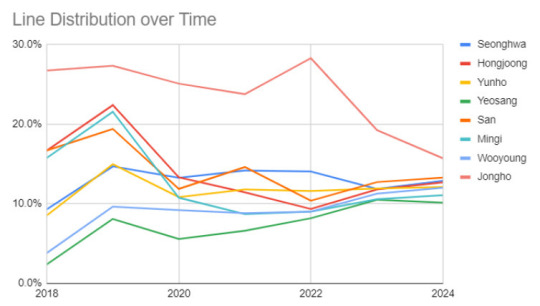
According to their data, "Yeosang's share of lines has increased by a net 76% since debut, while Jongho's has decreased by a net 77%"
While their data does not include GH1 and GH2, it would appear that the group has achieved a relative level of parity. The turning point appears to be 2022, about the time they released Halazia. For a song that was meant to be filler between cbs, it has become one of the most significant tracks in the Ateez discography. I don't think it's a coincidence that Yeosang was the breakout star of that era, due to the song highlighting his wonderfully low vocals.
I also love to point out what a great dancer he is and Halazia really showcases this:


I think that GH2 was also a good era for Yeosang in terms of getting better line distribution, killing moments, and dance solos. His MMA dance break is still talked about:
I recently wrote about the "re-branding" of Yeosang (and Wooyoung) after his Esquire Korea cover. To quote myself:
These two former BigHit trainees each dealt with image issues early in their careers: Yeosang's beauty dominated the external perception of him as an idol who was nothing more than a pretty face, while Wooyoung internally struggled with his physical appearance, recently exacerbated by his diagnosis of a skin condition that flares up in the heat.
In response to these pressures, Yeosang and Wooyoung took on different personas when they debuted as Ateez.
In Yeosang's case, he was "a Maltese who insists he's a Doberman." Yeosang's characterization as pure, innocent, and hapless was (and still is) reinforced by the members as part of their fan service. KQ also allegedly overruled Yeosang on his choice of a Doberman as a representative animal for their Aniteez characters and discouraged him from going to the gym, so as to preserve his slim physique.
Yeosang himself has said that he's not too bothered by the Maltese/Doberman bit; yet, at the same time, Yeosang shows his true self in his performance. He is the kind of dancer that takes up space; his movements are filled with unexpected swagger and ferocity. I noticed this during his MMA solo; again during his Sticky dance challenge, and most recently during the concert film. It was his attitude that entranced me, not (only) his visuals. Around this time, he began to bulk up, seemingly in control of his body's appearance for the first time in a while. He has solo music on the horizon and more schedules coming his way.
Whether or not you want to use the Doberman metaphor, the Esquire Korea feature feels like Yeosang reshaping his image.




Yeosang's poses draw attention to his bulging biceps, his large hands, veiny forearms, and exposed forehead. These attributes all signal traditional masculinity and almost aggressively sends the message: this is a man, not a "good boy."
My quote comes from a clip of Yeosang, San, and Wooyoung on Jaejoong's variety show. It should be noted that Jaejoong is considered the platonic ideal of a center visual. Jaejoong was allegedly blacklisted from entertainment after his lawsuit with SM led to the national elimination of the so-called idol "slave contracts" with entertainment companies, yet SM continues to use him as the visual blueprint with selecting idols. Jaejoong's compliments to Yeosang therefore feels almost double-edged: Yeosang fits the Jaejoong type, but there are certain expectations and pressures that come with this role, and consequences for stepping out of line.
Yeosang's Esquire photoshoot therefore feels transgressive and affirming, given how much he's tried to show the fandom how we've continually underestimated him.
Here's what Yeosang has said about the way fans perceive(d) him in last year's interview with GQ magazine:
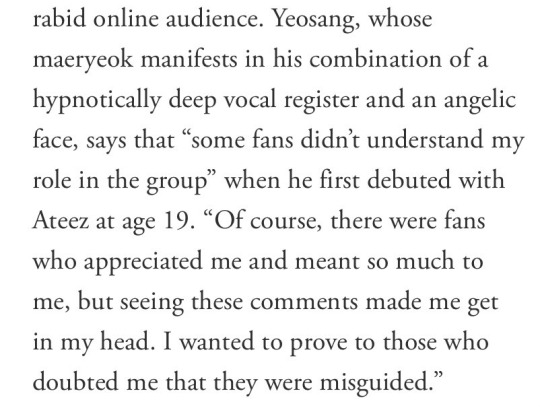
He used the word "misguided" (so polite! so passive agressive!) which unfortunately still seems to be the case among certain parts of the fandom who either diminish his talents or refuse to engage with his very real and articulated desire for more dance solos, more opportunities for modeling, and the chance to sing and perform more than he already does. The latter part of the fandom, many of whom are self-professed Yeodongies, want the best for him but also seem to have a hard time accepting that this is a grown adult man with his own objectives and that keeping him confined to the "all rounder" position may do more harm than good in the long run.
If Yeosang can do everything well, then what exactly makes him stand out?
Once again, I am really optimistic about this comeback for Yeosang. I'm excited to see him further explore and define his own artistry. The Sangaissance is upon us!
#ateez#kang yeosang#ateez meta#song mingi#jeong yunho#park seonghwa#choi san#jung wooyoung#kim hongjoong#choi jongho#thirst answers
49 notes
·
View notes
Note
https://www.tsn.ca/hockey-canada/laura-stacey-details-journey-from-healthy-scratch-to-key-contributor-at-women-s-worlds-1.2285714

Stacey details journey from healthy scratch to key contributor at Women’s Worlds
Laura Stacey’s journey to being one of the premier power forwards in women’s hockey has been filled with epic highs and lows.
The highs feature winning an Olympic gold medal in 2022, three World Championship titles and being one of the first three players signed by Montreal when the Professional Women’s Hockey League was founded in 2023.
The lows include breaking both her wrists at the same time in her final NCAA game at Dartmouth and the disappointment of not getting a lot of playing time for Team Canada earlier in her national team career.
Now 30, Stacey has blossomed into a top player in the PWHL with the Victoire, seeing top-line minutes alongside teammate and wife Marie-Philip Poulin, with who she tied the knot in September of 2024.
In her second PWHL season, Stacey had 10 goals and 20 points in 24 games before heading to her seventh Women’s World Championship in Czechia. She credits the maturation process for her current success as a player.
“Honestly, a lot of people tell me I’m a completely different player and I do believe that to some extent, but I don’t think it has anything to do with skill,” Stacey told TSN. “Of course I worked on a lot of things, of course I’ve spent way more hours on the ice and have got to play with and against some amazing people that have pushed me, but I would say I’m more a different player just because I’ve matured. I’ve grown up.”
Team Canada forwards Blayre Turnbull and Emma Maltais both play for the PWHL’s Toronto Sceptres and have been on the opposing side several times the past two years with the task of trying to stop Stacey.
“It's a challenge,” said Turnbull. “She's relentless with her work ethic and her commitment to winning battles and to getting the puck to the net. So, as someone who often has to try to shut that down, it can be very challenging at times. She's someone, as everyone knows, if you watch a PWHL game that she's in, her speed is incredible. So, trying to match her speed and her work ethic is definitely a challenge, but I always find it really fun.”
“I think also her ability to take control of a game, take the puck from end to end and maintain possession of it, is a really big quality,” said Maltais. “She's scary whenever she has the puck.”
PWHL: Victoire 4, Frost 1
00:02 / 01:21
PWHL: Victoire 4, Frost 1Marie-Philip Poulin and Laura Stacey each scored two goals to help the Victoire secure the first PWHL playoff spot this season after a victory over the Frost. Montreal moved into sole possession of first place in the standings after its first regulation win in its last six road games.
Despite making seven straight Worlds rosters and the past two Olympic teams, Stacey admits she still gets nervous when a new Canadian roster is about to drop.
Stacey’s first few experiences playing at the Women’s Worlds did not go how she wanted. She debuted in 2017 and did not register a point in five games as Canada went home with silver. In 2019, she had three points in seven games, but Canada had a program-low result of bronze.
Fast forward to 2021 when Canada rose up to win gold at the Worlds for the first time since 2012, Stacey was in the stands as a healthy scratch and appeared in just one game the entire tournament.
“Making the senior team is quite the jump,” said Stacey. “I think when you’re a young kid you just think, ‘Okay I’m going to make the U18 team, I’m going to make the development team and then I’m going to make the senior team’ and I think there was quite a bit of a news flash to me when that linear progression got halted quite a few times and you don’t know what the difference is. You don’t know what that next step looks like, but you see other people making it.”
Canadian national team head coach Troy Ryan remember having a lot of frank conversations with Stacey about where she belonged on the team.
“I give her a lot of credit for actually just taking the time to meet with me, to share some of her thoughts,” said Ryan. “And I know she went through a hard journey herself in trying to navigate where she fits on the national-team level.
“I don't think, me as a coach, but her as an athlete, if we ever get to the point where we are today right now in our coach-athlete relationship, if Laura doesn't take the time to have those tough conversations and try to get an idea where I may be thinking or where our staff may be thinking and where she believes she could be as an athlete.”
Stacey says it started by focusing on being the best forechecker on the team with eyes on eventually being the best penalty killer. She had her best World Championship outing offensively last year, with two goals and three assists in seven games as Canada won gold.
Maltais, who was also on that gold-medal winning roster in 2024, counts Stacey as one of her best friends and has matching tattoos with her and forward Jill Saulnier after the trio played together at the 2022 Olympics. As one of the younger players who made the senior team for the first time in 2021, she says Stacey is a role model.
“Laura is one of the more resilient people that I've met,” said Maltais. “I think her experience – she's really had to battle back to become who she wants to be. And I think that's what makes her such an inspiring role model for a lot of us. I think the way she carries herself on a daily basis, she's not arrogant. She doesn't expect anything to come to her. She just does it. And I think those years of adversity for her definitely shaped her into who she was.”
Despite all the trials and tribulations, Stacey doesn't take her success for granted and is not content to rest on her laurels.
“It definitely wasn’t a linear, easy path but I think all of us can kind of relate to that,” said Stacey. “There’s ups and downs, there’s broken bones, there’s heartache, there’s getting cut, there’s all of those in between. But I think once you have that spark, once you have that feeling of ‘Oh my gosh there’s so much possible here’ I think it just keeps driving you and pushing you forward.”
38 notes
·
View notes
Text
The death of the US government's Affordable Connectivity Program (ACP) is starting to result in disconnection of internet service for Americans with low incomes. On Friday, Charter Communications reported a net loss of 154,000 internet subscribers that it said was mostly driven by customers canceling after losing the federal discount. About 100,000 of those subscribers were reportedly getting the discount, which in some cases made internet service free to the consumer.
The $30 monthly broadband discounts provided by the ACP ended in May after Congress failed to allocate more funding. The Biden administration requested $6 billion to fund the ACP through December 2024, but Republicans called the program “wasteful.”
Republican lawmakers' main complaint was that most of the ACP money went to households that already had broadband before the subsidy was created. Federal Communications Commission chair Jessica Rosenworcel warned that killing the discounts would reduce internet access, saying an FCC survey found that 77 percent of participating households would change their plan or drop internet service entirely once the discounts expired.
Charter's Q2 2024 earnings report provides some of the first evidence of users dropping internet service after losing the discount. "Second quarter residential Internet customers decreased by 154,000, largely driven by the end of the FCC's Affordable Connectivity Program subsidies in the second quarter, compared to an increase of 70,000 during the second quarter of 2023," Charter said.
Across all ISPs, there were 23 million US households enrolled in the ACP. Research released in January 2024 found that Charter was serving more than 4 million ACP recipients, and that up to 300,000 of those Charter customers would be "at risk" of dropping internet service if the discounts expired. Given that ACP recipients must meet low-income eligibility requirements, losing the discounts could put a strain on their overall finances even if they choose to keep paying for internet service.
“The Real Question Is the Customers’ Ability to Pay”
Charter, which offers service under the brand name Spectrum, has 28.3 million residential internet customers in 41 states. The company's earnings report said Charter made retention offers to customers that previously received an ACP subsidy. The customer loss apparently would have been higher if not for those offers.
Light Reading reported that Charter attributed about 100,000 of the 154,000 customer losses to the ACP shutdown. Charter said it retained most of its ACP subscribers so far, but that low-income households might not be able to continue paying for internet service without a new subsidy for much longer:
"We've retained the vast majority of ACP customers so far," Charter CEO Chris Winfrey said on [Friday's] earnings call, pointing to low-cost internet programs and the offer of a free mobile line designed to keep those customers in the fold. "The real question is the customers' ability to pay—not just now, but over time."
The ACP lasted only a couple of years. The FCC implemented the $30 monthly benefit in early 2022, replacing a previous $50 monthly subsidy from the Emergency Broadband Benefit Program that started enrolling users in May 2021.
Separately, the FCC Lifeline program that provides $9.25 monthly discounts is in jeopardy after a court ruling last week. Lifeline is paid for by the Universal Service Fund, which was the subject of a constitutional challenge.
The US Court of Appeals for the Fifth Circuit found that Universal Service fees on phone bills are a "misbegotten tax" that violate the Constitution. But in similar cases, the Sixth and Eleventh circuit appeals courts ruled that the fund is constitutional. The circuit split increases the chances that the Supreme Court will take up the case.
60 notes
·
View notes
Text
Adrian Beaumont at The Conversation:
With 52% of enrolled voters counted, The Poll Bludger has Labor ahead in 92 of the 150 House of Representatives seats, the Coalition in 43, the Greens in two, independents in 11 and others in two. In called seats, Labor is on 76 (already a majority), the Coalition 32, independents six and others two. Labor has gained ten seats and the Coalition has lost ten, including Peter Dutton’s Dickson to Labor. It’s amazing that Labor has held the Victorian seat of Aston, which they had gained from the Coalition during Labor’s honeymoon period. The Poll Bludger gives Labor a projected national two-party preferred vote of 54.5–45.5, a 2.4% swing to Labor since the 2022 election. Current primary votes are 34.7% Labor (up 2.3%), 30.5% Coalition (down 3.9%), 12.8% Greens (up 0.3%), 6.2% One Nation (up 1.3%), 2.0% Trumpet of Patriots (new), 8.1% independents (up 4.5%) and 5.8% others (up 0.6%). I believe this election result was mostly because Dutton became too close to One Nation and Donald Trump for the Australian people to tolerate. Dutton would have done better to have stuck to the cost-of-living issue and avoided culture wars. With the addition of the YouGov poll below, Albanese finished the campaign at a net -4.2 using an average of five polls in the final week that asked for leaders’ ratings. Dutton finished at -20.8. The Canadian election on Monday and now Australia’s election demonstrate the left’s ability to win elections. Many thought Trump’s election would herald an era of right-wing dominance, but both Canada’s Conservatives and Australia’s Coalition lost what had looked like wins two months ago. Both leaders also lost their seats. Before the 2022 Australian election, I wrote that Australia and Canada could be strong for the left owing to big cities that make up a large share of the population in both countries. The right’s gains in the last decade have been biggest in regional areas.
Less than a week after Canada rejected right-wing lunacy, Australia also said “No MAGA BS” at the polls, as PM Anthony Albanese and his Labor party prevailed with a big majority and the opposition Coalition losing seats including their own leader’s (Peter Dutton).
See Also:
The Guardian: Australia re-elects Anthony Albanese as Labor rides anti-Trump wave to seal crushing win
HuffPost: Australian Prime Minister Anthony Albanese Wins Reelection In Another Blow To Trump
14 notes
·
View notes
Text
every once in a while i like to poke my head into "anti [x]" tags just to see what the other side thinks. recently i was looking through "anti ao3" and found a really funny post claiming that ao3 is not anticapitalist, but actually the Definition Of Capitalism, bc it relies on volunteer labor while supposedly having the money to pay a staff.
oh, honey.
but i am not going to make unsubstantiated claims on the internet, no, and this gives me an excuse to look at ao3's whole budget myself, which i've been meaning to do for a while. these numbers are taken from the 2022 budget post and budget spreadsheet.
ao3's total income for 2022, from the two donation drives, regular donations, donation matching programs, interest, and royalties was $1,012,543.42. less than $300 of that was from interest and royalties, so it's almost all donations. and that's a lot, right? surely an organization making a million dollars a year can afford to pay some staff, right?
well, let's look at expenses. first of all, they lose almost $37,000 to transaction fees right away. ao3 and fanlore (~$341k and ~$18k, respectively) take up the biggest chunks of the budget by far. that money pays for, to quote the 2022 budget post, "server expenses—both new purchases and ongoing colocation and maintenance—website performance monitoring tools, and various systems-related licenses."
in some years, otw also pays external contractors to perform audits for security issues, and for more servers to handle the growing userbase. servers are expensive as hell, guys. in 2022, new server costs alone were $203k.
each of their other programs only cost around $3,000 or less, and otw paid around $78k for fundraising and development. wait, how do you lose so much money on your fundraising?? from the 2022 budget post: "Our fundraising and development expenses consist of transaction fees charged by our third-party payment processors for each donation, thank-you gift purchases and shipping, and the tools used to host the OTW’s membership database and track communications with donors and potential donors."
then the otw paid an additional $74k in administration expenses, which covers "hosting for our website, trademarks, domains, insurance, tax filing, and annual financial statement audits, as well as communication, management, and accounting tools."
in case you weren't following all of that math, the total expenses for 2022 come out to $518,978.48. woah! that's a lot! but it's still only a little over half of their net revenue. weird. i wonder what they do with that extra $494k?
well, $400k of it goes to the reserves, which i'll get to in a second. the last $93k, near as i can tell, gets rolled over to the next year. i'll admit this part i'm a little unsure about, as it's not clear on the spreadsheet, but that's the only thing that makes sense.
the reserves, though are clear. the most recent post i could find on the otw site about it were in the board meeting minutes from april 2, 2022: "We’re holding about $1million in operating cash that is about twice the amount of our annual operating costs. There is another $1million in reserves due to highly successful fundraisers in the past. The current plan for the reserves is to hold the money for paid staff in the future. It’s been talked about before in the past and we’re still working out the details, but it’s a rather expensive undertaking that will result in large annual expenses in addition to the initial cost of implementation."
woah....they're PLANNING to have paid staff eventually! wild!
so let's assume, for easy numbers, that the otw currently has $1.5 million in reserves. before we even get to how to use that money, let's look at the issues with implementing paid staff:
deciding which positions are going to be paid, because it can't be all of them
deciding how much to pay them, bc minimum wage sure as hell isn't enough, and cost of living is different everywhere, and volunteers come from all over the world
hiring staff and implementing new systems/tools to handle things like payroll and accounting
making sure you continue to earn enough money both to pay all of the staff and have some in reserves for emergencies or leaner donation drives
probably even more stuff than that! i don't run a nonprofit, that's just what i can think of off the top of my head.
okay, okay, okay. for the sake of argument, let's assume there is a best-case scenario where the otw starts paying some staff tomorrow. how much should they be paid? i'm picking $15 an hour, since that's what we fought for the minimum wage to be. by now, it should be closer to $20 or $25, but i'm trying to give "ao3 is capitalism" the fairest shot it can get here, okay?
ideally, if someone is being paid to help run ao3, they shouldn't need a second job. every job should pay enough to live off of. and running a nonprofit is hard work that leads to a lot of burnout--two board members JUST resigned before their terms were up. what i'm saying is, i'm going to assume a paid otw staff is getting paid for 40 hours of work a week, minimum. that's $31,200.
at $400,000 per year, the otw can afford to pay 12 people. that's WITHOUT taking into account the new systems, tools, software, etc they would have to pay for, any kind of fees, etc, etc.
oh, and btw, if you're an american you're still making barely enough to survive in most places, AND you don't have universal healthcare, vision, or dental. want otw to give people insurance, too? the number of people they can pay goes down.
it's. not. possible.
a million dollars is a lot of money on the face of it, but once you realize how MUCH goes into running something like the otw, it goes away fast.
just for reference, wikipedia also has donation drives every year. wikipedia, as of 2021, has $86.8 million in cash reserves and $137.4 million in investments. sure, wikipedia and ao3 are very different entities, but that disparity is massive. and i should note that if you give $10 to wikipedia they don't give you voting rights, i'm just saying.
by the way, you may have noticed that i didn't mention legal costs at all here. isn't one of otw's big Things about how they do legal advocacy?
yes, it is. they have a whole page about that work. and i can't for the life of me find a source on otw's website (and i'm running out of time to write this post, i'll look harder later), but i am 90% sure i learned before that most, if not all, of otw's legal work/advice/etc is done pro bono. i've also seen an anti-ao3 person claim their legal budget is only $5k or so, but they didn't have a source. but keep in mind that if they don't have a legal budget, all the numbers above stay the same, and if they do, there is even less money available for paid staff.
you can criticize ao3 and the otw all you want! there are many valid reasons to criticize them, and i do not think they're perfect either. but if you're going to do so, you should at least make sure you can back up your claims, bc otherwise you just look silly.
#ao3#otw#anti ao3#bc i want them to see this#otw board#ao3 discourse#ao3 donations#wren wrambles#that post was so unserious i died#if it was more recent (its from mid-july) i wouldve replied directly maybe#but i didnt want to drag the body of a 6-note post into the light OR attack the op directly so#also! if i misunderstood something pls let me know im doing my best
231 notes
·
View notes
Text

LETTERS FROM AN AMERICAN
November 20, 2024
Heather Cox Richardson
Nov 20, 2024
Remember how American voters so hated Project 2025, the playbook for a second Trump term written by the Heritage Foundation and other right-wing institutions, that Trump said he had nothing to do with it, and then one of its key architects, Russell Vought, told undercover filmmakers that Trump was only running away from the project as political cover?
It appears Vought was right and the story that Trump had nothing to do with Project 2025 was, indeed, just political cover. Ed O’Keefe and Major Garrett of CBS News reported today that two sources close to the Trump transition team have told them that they expect Trump to name Vought to lead the Office of Management and Budget (OMB).
Vought wrote the section of Project 2025 that covers the presidency, calling for “aggressive use of the vast powers of the executive branch” to “bend or break the bureaucracy to the presidential will” and identifying the OMB as the means of enforcing the president’s agenda. Vought was Trump’s OMB director during the end of his first term and tried to remove the civil service protections that have been in place since 1883 to protect federal workers from being fired for political reasons. That plan, known as Schedule F, would have affected about 88% of the federal workforce.
One of the first things Biden did when he took office was to rescind Trump’s executive order making that shift.
Like that earlier attempt, Project 2025 leans heavily on the idea that “personnel is policy,” and that idea illuminates the choices the Trump team is making. Trump has refused to sign the official documents required by the 2022 Presidential Transition Act. Those documents mandate ethics commitments and require the incoming president to disclose private donations. They also limit those donations. Without the paperwork, Trump appointees cannot start the process of getting security clearances through the Federal Bureau of Investigation; the team says it is planning to do its own vetting of its candidates instead.
Claiming they have a mandate, Trump’s people have said they are launching “a hostile takeover” of the American government “on behalf of the American people.” But as voting numbers continue to come in, Trump’s majority has fallen below 50% of voters, meaning that more voters chose someone else than chose Trump on November 5. These results are far from being in “mandate” territory.
The U.S. Constitution charges Congress with writing the laws under which the American people live, and the president with taking “care that the laws be faithfully executed.” Since 1933, Congress has created an extensive system of agencies that regulate business and provide a basic social safety net. Congress will say, for example, that the U.S. needs an agency to protect the environment (like the Environmental Protection Agency, established under Republican president Richard M. Nixon), appropriate money for it, oversee its leadership, and then trust those leaders to hire the personnel necessary to carry out its mission.
Regulations and social welfare programs and the agencies that provide them are broadly popular—think how hard it has been for members to get rid of Social Security, for example—so Congress trims at the edges rather than abolishing them. As the U.S. budget has grown, they often bear the brunt of accusations that the government spends too much, although what has really caused the budget to operate deeply in the red is the tax cuts for the wealthy put into place by Presidents George W. Bush and Donald Trump.
Right-wing leaders who want to continue cutting regulations and taxes are newly empowered by Trump’s victory in the 2024 election, and they are turning to a quirk of the government to enable them to work around Congress.
Since the first administration of President George Washington, agencies created by Congress have lived in the Executive Branch. If, as Vought and others argue, the president is the absolute authority in that branch, Trump can do whatever he wants with those agencies and the civil servants—the bureaucrats—who run them.
In an op-ed in the Wall Street Journal today, billionaires Elon Musk and Vivek Ramaswamy laid out their plans for cutting the U.S. government. Neither of them has ever held elected office, but they see that as an advantage, not a downside: “We are entrepreneurs, not politicians,” they write. “We will serve as outside volunteers, not federal officials or employees.” Trump has named them to the “Department of Government Efficiency,” or DOGE. Despite the “department” name, DOGE is not an official government agency—which would require ethics disclosures—but rather an advisory panel.
Their op-ed begins by redefining congressional authority to create agencies to suggest that agencies are illegitimate. “Most government enforcement decisions and discretionary expenditures aren’t made by the democratically elected president or even his political appointees,” they write, “but by millions of unelected, unappointed civil servants within government agencies who view themselves as immune from firing thanks to civil-service protections.” This, they say, “imposes massive direct and indirect costs on taxpayers.”
“Thankfully,” they continue, “we have a historic opportunity to solve the problem. On Nov. 5, voters decisively elected Donald Trump with a mandate for sweeping change, and they deserve to get it.”
While “politicians” have “abetted” an “entrenched and ever-growing bureaucracy,” they write, they will work with the OMB to identify regulations that, they claim, Trump can issue an executive order to stop enforcing. “This would liberate individuals and businesses from illicit regulations never passed by Congress and stimulate the U.S. economy,” they write. Should Trump want to cut things that Congress wants to fund, they claim that Trump will simply refuse to spend those appropriations, challenging the 1974 Impoundment Control Act that declared such withholding illegal.
Musk and Ramaswamy reiterated their support for cutting programs that are not currently authorized, although budget experts note that such a lapse is a tool to permit adjustments to programs Congress has, in fact, authorized and have also pointed out that one of the top items on that list is health care for veterans. Cuts to all these programs will naturally mean extensive cuts to the federal workforce.
“With a decisive electoral mandate and a 6–3 conservative majority on the Supreme Court,” they write, “DOGE has a historic opportunity for structural reductions in the federal government. We are prepared for the onslaught from entrenched interests in Washington. We expect to prevail. Now is the moment for decisive action.”
They conclude by asserting that “[t]here is no better birthday gift to our nation on its 250th anniversary than to deliver a federal government that would make our Founders proud,” which is one heck of a conclusion to a blueprint for taking the power of American lawmaking from the Congress, where the Framers put it, and delivering it into the hands of an extraordinarily powerful president acting on the advice of two unelected billionaires, one of whom wasn’t born in the United States.
In the vein of getting rid of regulations, today the chief executive of Delta Air Lines said he expected the Trump administration would be a “breath of fresh air” after the Biden administration’s consumer-protection laws that he called government “overreach.”
Meanwhile, in Washington, the Senate has been confirming President Joe Biden’s judicial nominees, with the absence of Republican senators making the confirmations easier.
LETTERS FROM AN AMERICAN
HEATHER COX RICHARDSON
#Letters From An American#Heather Cox Richardson#Project 2025#Delta Air Lines#deregulation#Congress#unelected billionaires#corruption#Wall Street Journal#Environmental Protection Agency#hostile takeover
21 notes
·
View notes
Text
So the parents are watching The Pitt, as one does these days- my dad is better at keeping up with the pop culture zeitgeist than I am, which is probably a side effect of teaching teenagers, and also not saying much. I was making tea while the storyline about the kid with- either measles pneumonia or measles enceph, I'm guessing- and the antivaxxer mother was going on, and I made a throwaway comment of: wow, these guys sure have a lot of time, if it were up to me I'd have the parents sign a home against medical advice waiver and kick them out, clear up the bed for a patient who needs it. Besides, what was the best case scenario here, save the kid's life and have him grow up to be a happy healthy MAGA voter?
They were mildly horrified.
The thing is, right, I suppose I'm having a crashout but it's not like there's anything I have to crash out from. I figured I'd left my job and my island behind in 2022 and took a nice long societally-acceptable vacation in Oxford a.k.a. a postgraduate degree and it should all be fine now, except in 2022-2023 I could still see patients. I was furious at the people of [redacted] but I could still see patients and go to our org's partner communities and chat, and now I would rather chew off all my fingers than set foot in my old beloved clinic. I love my patients, individually! But the thought of interacting with patients, in general, has me frothing with anger.
I can't even, like, check my [messaging platform], because there's a 75% chance that a nice polite "hi how are you" from someone I know from [redacted] will turn out to be a consultation, and actually that's my fault! I can't blame them for it! I went to a town that had only had a regular town doctor for, what, ten years, by the time I arrived. I was responsible for how a lot of people would end up viewing health care. The one incontrovertible inflexible conviction I hold is that health is a right, and I needed everyone to know that. It was their right to access health services, it was their right to consult with their municipal doctor, and we could work the etiquette out later on. Only now I've left and it's later on and I sleep like twelve hours a day and even so I cannot muster up the energy to help people out when they ask, not even to say that hey, [redacted] is a great doctor, she runs the place now, go and see her.
And, right, it's not their fault. There are people at fault here but it's not the good folk of [redacted], even as they swallowed the "the COVID vaccine will turn you into a zombie after two years" myth hook line and sinker and proceeded to spew it on Facebook, even as they rallied around leaders who wanted to let it rip to the extent that it cost my principal her election, just because they wanted to go to [redacted] and eat at Jollibee. All of that's just a result of pouring a shitton of economic and social and cultural factors- a barely literate and extremely poor populace created by a desperately underfunded public education system, a reliance on Facebook for information brought about by the slowest and most expensive Internet in Southeast Asia and the absence of net neutrality, a Pentagon-funded psyops in a proxy war*, a fucking. cult.- into a boiling cauldron to make the world's worst soup.
I know this intellectually. I know you need to invest time to build a relationship and trust, to get people to learn, to get people to change their minds. I know that the distrust of authority and expertise is due to the abuse of authority and the apathy of expertise. They are my patients. Talk to them on an individual basis and I love them all.
But also I hate them. When I was starting out I knew I cared more for the system than the patient, but it was not like this, where, when I have to interact with someone in a healthcare capacity, I just get this frozen rictus of a smile on my face. I never want to do direct patient care ever again. This is extremely difficult to explain to people who think doctor = someone who sees patients, which is like 90% of people. It's also extremely hypocritical to say, health is a right, but also you cannot pay me enough money to provide health services to people, find someone else to do it. But if you hate your patients, you should not be in the job of caring for patients, and I do not know how to stop.
*J unrealcities lore: Reuters interviewed me for that article, though they ultimately did not include those bits. Fun times.
8 notes
·
View notes
Text
In 2022, a poll by the Southern Poverty Law Center found, among other things, that negative perceptions of feminism were higher among younger American voters than older, across both gender and political lines. In fact, the sharpest contrast was between older and younger male Democrats: only 4% of Democratic men over 50 believe feminism has been a net negative, but among Democratic men under 50 the rate is 46%.
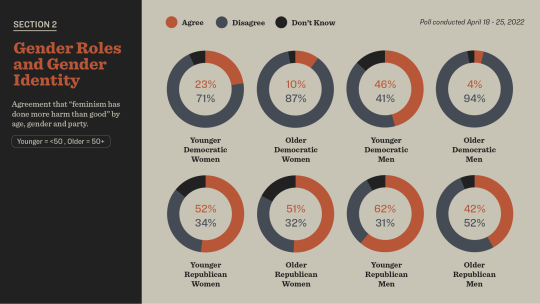
Obviously I don’t expect tumblr’s opinions to align fully with a broader poll of Americans, but I’m curious just how different they are. So, a poll of my own, if you’ll indulge me:
Please reblog for sample size! And maybe, I don’t know, have some gentle conversations with the men in your life to figure out where this is coming from?
24 notes
·
View notes